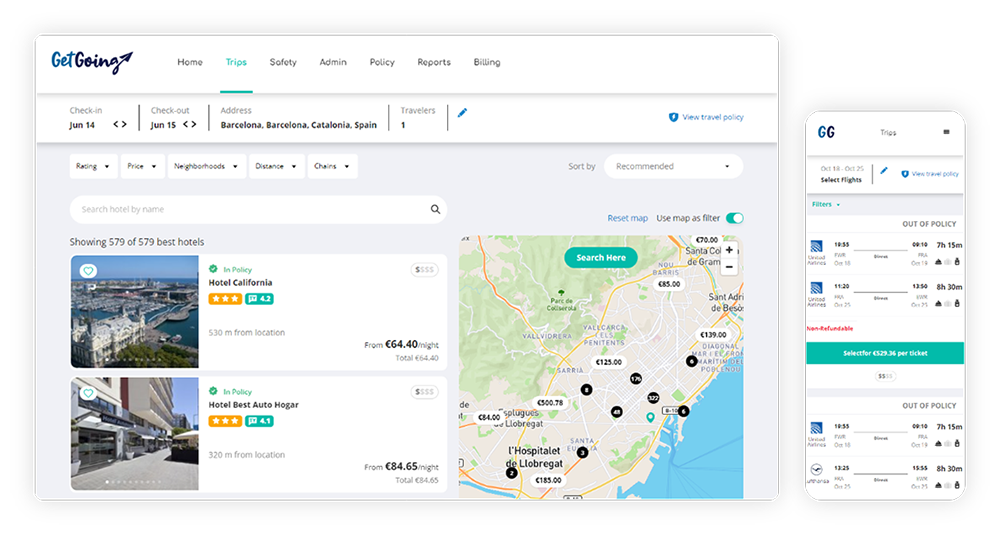As travel managers constantly look for ways to optimize their corporate travel programs, part of doing so is understanding the differences between going digital or taking your travel management needs offline. In this explanatory guide, we will look at the pros and cons of online travel agencies vs. offline travel agencies so that you are prepared to understand the differences in order to choose the travel booking tool and management system that is most suitable for your company.
Here’s what we’ll cover:
- Types of online booking tools
- Pros and cons of online travel agencies
- Offline travel agencies
- Pros and cons of offline travel agencies
- How to choose the best corporate travel platform
Let’s start with a short introduction to some simple terminology to give you a guiding hand.
Types of online booking tools
For starters, to recognize the difference between online travel agencies and offline, it’s important to understand that there is a wide range of online booking tools available for travel. Let’s take a look at the different types:
- Travel aggregators
- Corporate online booking tools
- Direct bookings
- Travel agencies

Travel aggregators
Travel aggregators are websites that essentially consolidate the travel offers and prices from multiple sources all in one place. This allows users to book at the lowest prices based on the results listed in the search results. This helps users find the best prices out of all the results the aggregator has found. This way it is easy for consumers to know that they are booking at the lowest price possible.
TMCs like BCD (which we will discuss more in detail below) can function as a travel aggregator. For instance, for hotel bookings, TMCs combine GDS content with content from Expedia, Booking.com, HRS, and others offering this all together in a mobile app or website. In the case of AMEX, they have a proprietary online booking tool, called KDS, which also
serves as a travel aggregation tool.
Corporate online booking tools
When it comes to business travel, corporate online booking tools are frequently used by businesses to keep a hand on their business travelers. Corporate online booking tools are ideal for keeping track of trips, travel spend, and ultimately streamlining business travel. GetGoing and Booking.com for business are examples of corporate online booking tools, as well as EHI Direct.
Direct bookings
Direct bookings are carried out by going directly to the airline, hotel, train or rental car company’s respective sites and booking directly instead of through a third party.
Travel agencies
We will look more at online travel agencies, or OTAs below, but the idea is that you can get access to travel inventory all in one place. Online travel agencies are the most common way of booking online travel.
What is a TMC?
A TMC, or a Travel Management Company uses a Global Distribution System (GDS) as a travel booking tool. TMCs started before the boom of online travel. Travel was booked in a traditional way via telephone or email and then arrangements were made by travel agents.
Nonetheless, TMCS have evolved since their beginnings, investing in making business travel more digital even though they still have a way to come in terms of technology. TMCs offer the value of industry experience while offering more personal service through their agents. TMCs integrate custom-built booking preferences to give business travelers the best choices within their travel policy, allowing them to compare options. As a travel manager you can work with your TMC to decide how you want to set up your business travel program.
A TMC like BCD Travel, AMEX, and CWT can help companies make the most of their travel in general beyond just booking travel. They can give a helping hand with cost analysis, reporting, duty of care, etc., but that isn’t to say that an online travel agency won’t provide you with data reports of your travel spend.
Full-service business and corporate travel management companies can help optimize, manage and improve your business travel, ensuring you adhere to your travel policy, and providing seamless booking experiences, while offering a hand with travel data, allowing you to optimize your travel spend and costs to make the most out of your business travel program.
What is an OTA?
OTAs, or online travel agencies offer customers the possibility to book their travel
online. OTAs started in 1996 with Travelocity being the first online travel agency. Most of them started off with a strong digital product and platform and added agent support/service as an added benefit.
They are third party agents who sell services on behalf of airlines, hotels, car rental companies, tour operators and others. They arrange and sell accommodations, tours, transportation and trips on an online platform for travelers. Some well-known travel platforms such as Booking or Expedia act both as travel agencies and tour operators allowing customers to read reviews to decide where to stay, and also book package holidays.
Several online travel agencies are only customer-facing, like the above examples, whereas other OTAs can service both B2B and B2C like Booking.com, which offers services for business clients as well as regular customers. On the other hand, OTAs like GetGoing and Travel Perk are designed exclusively with Business travelers in mind.
What is an online travel agent?
An online travel agent is an OTA that is part of web-based platform that allows users to book travel services over the internet. Online travel agents are intermediaries between travelers and service providers like airlines, hotels, car rental companies and tour operators. They provide a central platform to book, compare and search for travel arrangements, whether it be for business or leisure.
OTAs have a big market share
The global business travel market is a $695.9 billion industry as of 2020, and is expected to reach $2,001.1 billion by 2028. Whereas the online travel market is a $433.2 billion dollar industry, with the revenue share of online sales in the global travel and tourism market at 66% (according to a study by Statista.com).
As can be noted by the 66% market share of online travel sales, the great majority of reservations are being made via online travel agencies, and for this reason, OTAs have become an important distribution channel for tourism businesses. While OTAs are often used to book holidays and leisure trips, there are also online travel agencies, known as Travel Management Companies, or TMCs that have the same functionality as OTAs but are primarily used by companies or businesses.
Advantages and disadvantages of online travel agency
An online travel agency is convenient, has a wide range of options, allows you to easily compare prices, can be a great way to see reviews and ratings from other users, gives special deals and discounts and is available 24/7. Some disadvantages of an online travel agency is that there may be hidden fees, you have less leeway for personalization, customer service is harder to track down, and there is less flexibility.
Pros and cons of
online travel agencies
Now that you have a better idea of some of the basic terminology, and some of the advantages and disadvantages of an online travel agency, let’s look at some of the pros and cons of an online travel agency.
Pros
online travel agency
1. An online travel agency is self-service
Online travel agencies are a way to self-manage your travel needs. They have an integrated online booking tool that allows you to make travel arrangements, make cancellations, manage bookings and do everything that a brick and mortar travel agency would let you do with the convenience and benefits of a self-service approach.
2. Keep track and manage travel expenses
In addition to being self-service, as a travel manager, with an online travel agency or TMC you can keep track of your travel spend and optimize your expenses while at the same time automating your travel policy so that travelers will be notified when their travel expenses are out of policy, and ensuring that you stay on budget.
3. Increased productivity
Working with an online travel agency leads to more productivity because you spend less time managing your trips. All your trip information is conveniently stored in your profile so that you can manage, edit and cancel hotel bookings, car rentals, train bookings as necessary. This means that in the case of travel managers, you can work with the OTA to automate your travel policy, which takes the automated work out of the hands of you and your travelers.
4. Help keep travelers safe
In the case of an online travel platform like GetGoing, you can have added assistance in keeping your traveler’s safe thanks to built-in AI technology that prefers the safe travel options, like not passing through high-risk countries, helping to fulfill your duty of care. You can also have access to traveler tracking and emergency support in the case of need.
Cons
online travel agency
1. Less personal
While online provides great convenience, one of the cons is that it is less personal, lacking the personal touch of an in-person offline travel agency. Of course there is always the possibility to call, chat or speak to a representative, it’s not the same as a face-to-face encounter, especially for managing business.
2. Less hand-holding
For those inexperienced travelers, online travel agencies can be more “do-it-yourself” meaning that there is less hand-holding if you need it. This can take away from productivity because travelers must evaluate the options themselves, rather than having a TMC that can give you a helping hand. A TMC would be able to discover the most effective (and safest options), meaning less layovers in potentially risky countries.
3. Hard to get around the rules
When you are working with an offline agency it’s easier to bend the rules or get around travel provider’s policies. TMCs can oftentimes make changes to bookings without charges that travelers or travel managers on their own wouldn’t be able to do thanks to their business relationships with the providers.

Offline travel agencies
Now that we’ve looked in depth at online travel agencies, let’s take a look at offline travel agencies, including their pros and cons.

What is an offline travel agency?
Offline Travel Agencies are travel agencies, including corporate travel departments, who operate from “brick and mortar” offices. This means that they have physical offices rather than operating as an OTA with only a website. Customers typically call or go to their offices to get travel-related services, which they provide using a GDS like Galileo. An offline travel agency usually has a team of travel agents who can help clients book flights, hotels, car rentals and other travel services.
While it’s true online travel agencies have gained popularity for their convenience, there are still many who prefer the personalized service provided by a face-to-face interactions at offline travel agencies. Offline travel agencies may cater to a specific market or specialize in certain kind of travel, i.e., business travel, group trips, leisure travel, etc. and this kind of assistance and hand-holding may give clients a sense of reassurance.
Advantages and disadvantages of offline travel agency
An offline travel agency has its advantages like the ability to get expert advice, personalized service, the face-to-face component, the ease of problem resolution, and the convenience of being hand-held along the process of booking travel. However, there are also some disadvantages like limited accessibility, potentially higher costs, limited choices, time-consuming, constraints on availability of store hours, and perhaps less transparency.
Pros and cons of
offline travel agencies
Now that you have a better idea of what an offline travel agency does, as well as the advantages and disadvantages, let’s take a look at some of the pros and cons.
Pros
offline travel agency
1. It’s more personal
As much as we move more and more towards a digital-first approach, there is still an element of face-to-face contact that can’t be replaced. This is one of the main pros of an offline agency, being able to meet in person to book travel and even design your corporate travel program. Also for the travel agency, it’s easier to cater to the traveler’s needs, and really understand what they are looking for.
2. Enhanced service
Since online agencies tend to be more self-service, it can be argued that offline agencies offer enhanced services. Trip planning, including more complex routings or integrated travel booking, which include multiple forms of transport, accommodation and leisure activities can be more easily managed with an offline travel agency, setting them apart from their offline counterparts.
3. It’s more inclusive
While for the purposes of this article, we are more focused towards business travel, it goes without saying that offline travel agencies are more inclusive. According to a study by the UN’s ICT agency, an estimated 37% of the world’s population (2.9 billion people) have never used the Internet. For that reason, in underdeveloped countries, an offline travel agency is still crucial in order to service this part of the population.
Cons
offline travel agency
1. Not as flexible
With an offline travel agency, you must adhere to business hours in order to make your business travel plans. If it’s late at night and you are working after hours to plan your business trip, this means you’ll have to wait until the next business day to book your trip.
2. Less technology-forward
Of course, offline travel agencies use technology like GDS to book your travel, it goes without saying that a traditional offline travel agency is less technologically advanced. Unlike online agencies, they don’t have to rely on technology or even have a fast website to help make travel plans. Since they are dealing with external systems for the most part, there is no precedent for having a technologically-forward website.
3. Less efficient
While it can be efficient to work with an offline agency when you are booking complex trips with multiple providers, it can be less efficient for everyday use. With OTAs, all the information is readily available making it quick and efficient to book a trip. In the case of going offline, you have to rely on the help of an agent to take care of your everyday travel needs, which can be less efficient than handling travel plans on your own.

How to choose the best corporate travel platform
Now that you’ve fully understood the pros and cons of an online travel agency vs. an offline travel agency, here are some tips to choose a corporate travel platform that’s right for you.
- Look for balance between online technology with offline support
- Ease of creating your travel policy
- Safety first
- Simple approach to data
- Allows you to save money
1. Look for balance between online technology with offline support
This means that you have a tool that has all the functionalities of an online travel platform, but with expert service and assistance when you need it most. Sometimes business travel doesn’t go as planned; there might be delays, lost luggage, long wait times, cancellations, overbookings or a wide range of other issues. This is why you need to have a support system in place that is ready to help when the going gets tough. At GetGoing you have the ease of digital but with the guarantee of 24/7 service when you need it. This way you can travel worry-free knowing that an expert is there to lend you a hand if any of these unexpected circumstances arise.
2. Ease of creating your travel policy
When it comes to creating your travel policy, you want to find a travel management company that will support you in creating a policy that allows you to save money, protect your travelers and optimize your business travel. This is why you should look for a TMC that allows you to automate your travel policy. Automation is at the core of productivity and by optimizing your travel policy, you can also save money.
3. Safety first
Whether you decide to go with an online travel agency or an offline travel agency, ensure that your traveler’s safety is first and foremost. This means that you should be able to offer certain security measures to your travelers so that as business travel slowly recovers, they feel safe to get going.
4. Simple approach to data
Not everyone on your team is data-savvy, so you want to find a corporate travel management system that makes understanding data easy. Whether you’re a Finance manager, an HR or Office Manager, you need to have a system that allows you to visualize your data, including travel spend, seeing how much travel is booked within your travel policy, and using detailed reports to optimize routes, supplier relations and keep your travelers happy. Having data at your fingertips is the best way to optimize your business travel program.
5. Allows you to save money
While optimizing your travel program, and understanding your data, you will without a doubt save money. However, another very important part of business travel is having access to corporate travel deals. Not only does having access to deals save you money, but your staff will also be more productive because they don’t have to look in a million different places for the best deals.
Get a helping hand in business travel
GetGoing is your helping hand in business travel so that you can book, manage and optimize your business travel. We provide the ease of a digital platform but with the peace of mind of a travel agency.
- Empower your team
- Save time and money
- Gain more visibility
- Ensure safe and comfortable travel


